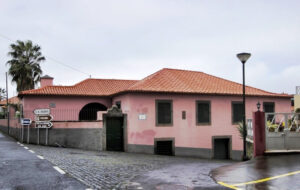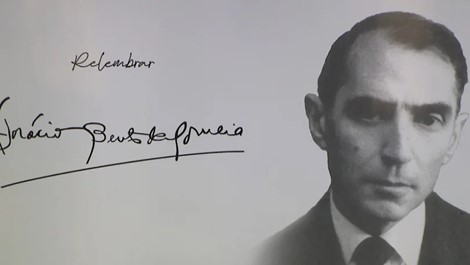Horácio Bento de Gouveia: The Literary Giant of Madeira
Horácio Bento de Gouveia stands as one of the most influential literary figures to emerge from the beautiful island of Madeira. His works have left an indelible mark on Portuguese literature, capturing the essence of Madeira’s landscapes, people, and culture. In this blog post, we will explore the life, work, and legacy of this celebrated Madeiran writer. We will delve into why his contributions remain relevant to this day.

Early Life and Background

Horácio Bento de Gouveia was born on December 4, 1901, in the small parish of Ponta Delgada, located on the north coast of Madeira. Growing up in a rural environment, Gouveia developed a deep connection with the natural beauty and traditions of the island, which later became central themes in his literary works.
Despite the challenges of living in an isolated area, Gouveia’s thirst for knowledge led him to pursue education. After completing his studies at the Liceu Nacional do Funchal, he moved to mainland Portugal. There he graduated in 1930 from the Faculdade de Letras at the University of Lisbon. This experience broadened his horizons and significantly influenced his literary style.
Literary Career and Major Works
Horácio Bento de Gouveia’s writing career is distinguished by his ability to intertwine Madeiran culture with universal themes.
1. “Ilhéus” (1949)
“Ilhéus” marks Horácio Bento de Gouveia’s first major novel. It is a fictional story that paints a vivid picture of the lives of Madeirans. The novel was later republished under its original title, “Canga”, in 1976, with previously censored chapters restored.
2. “Lágrimas Correndo Mundo” (1959)
This fictional novel explores the themes of sorrow and displacement, capturing the emotional struggles of characters as they navigate their lives within and beyond Madeira. The title, which translates to “Tears Running Through the World,” aptly reflects the poignant tone of the book.
3. “Águas Mansas” (1963)
“Águas Mansas” is another work of fiction by Gouveia that delves into the calm yet complex lives of its characters. The novel continues his exploration of human emotions and social dynamics within the Madeiran context.
4. “Canhendos da Ilha” (1966)
This collection of chronicles provides a more personal and reflective view of Madeira. Gouveia captures the essence of the island through a series of essays and reflections, offering readers a deeper understanding of the culture and daily life on Madeira.
5. “Alma Negra e Outras Almas” (1972)
This book is a compilation of short stories and chronicles centered around Madeira. The stories reflect the rich traditions, struggles, and humanity of the Madeiran people, further solidifying Gouveia’s role as a preserver of the island’s cultural identity.
6. “Canga” (1976)
This edition of “Ilhéus” reinstates the original title and restores the chapters that were previously censored. The novel continues to be one of Gouveia’s most significant works, portraying the social and economic challenges faced by the Madeiran people.
7. “Torna Viagem” (1979)
“Torna Viagem” is a novel that deals with the theme of return, a significant topic in Madeiran culture due to the island’s history of emigration. The story explores the lives of those who leave and eventually return to their homeland, bringing with them new perspectives and challenges.
8. “Margareta” (1980)
A departure from his typical rural settings, “Margareta” is an urban novel that explores the complexities of life in the city. This novel demonstrates Gouveia’s versatility as a writer and his ability to tackle diverse themes.
9. “Luísa Marta” (1986)
Completed in 1982 and published posthumously in 1986, “Luísa Marta” is another fictional novel that delves into the life of its titular character. The book continues Gouveia’s tradition of rich character studies set against the backdrop of Madeiran life.

Throughout his career, Gouveia published several other novels, short stories, and essays, each reflecting his profound understanding of Madeiran culture. His works often explore themes of social justice, human dignity, and the impact of modernization on traditional communities. By doing so, he not only preserved the cultural identity of Madeira but also contributed to the broader Portuguese literary canon.
Influence on Madeiran Culture
Horácio Bento de Gouveia’s influence extends beyond his literary achievements. His works have played a significant role in preserving the traditions, dialect, and customs of Madeira. Through his writing, he captured the spirit of the island. Thereby ensuring that future generations would appreciate the rich cultural heritage of Madeira.
Gouveia’s commitment to education also had a lasting impact. After returning to Madeira, he worked as a teacher and later as a school inspector. His passion for teaching and his dedication to his homeland helped shape the education system on the island. He thus inspired many young Madeirans to pursue literature and the arts.
Legacy and Recognition

Horácio Bento de Gouveia passed away on March 21, 1983, but his legacy lives on. He is remembered not only as a great writer but also as a cultural ambassador for Madeira. His works continue to be studied in Portuguese literature courses, and his contributions are celebrated in various cultural events on the island.
In recognition of his impact, several institutions in Madeira bear his name, including a school in Funchal. His works have also been translated into several languages, introducing the beauty of Madeiran culture to a global audience.
Conclusion
Horácio Bento de Gouveia’s contributions to literature and culture make him a true icon of Madeira. His ability to capture the essence of his homeland in his writing has left a lasting legacy that continues to inspire and resonate with readers worldwide. For anyone interested in exploring the rich cultural heritage of Madeira, diving into the works of Horácio Bento de Gouveia is a must.
Whether you are a literary enthusiast or simply curious about Madeira’s culture, the works of Horácio Bento de Gouveia offer a unique and enriching experience that will deepen your understanding and appreciation of this beautiful island.